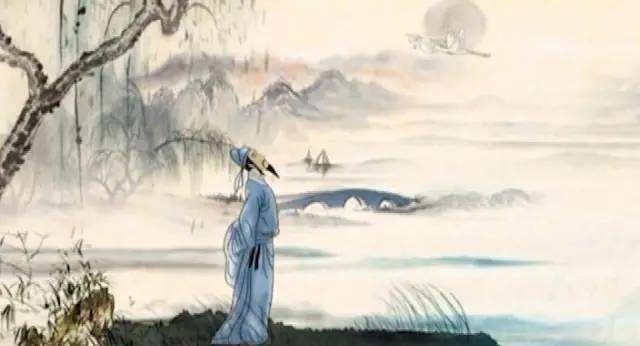Wang Zhizhuo, a famous poet of the Sheng Tang Dynasty and a native of Daizhou, Shanxi, together with Wang Changling, Gao Shi and Cen Shan, was jointly known as the "Four Great Border Poets" of the Tang Dynasty. There are only 6 surviving poems by Wang Zhizhuo, but they are the first classics. Today, we will enjoy his 6 immortal masterpieces together.

"Climbing the Stork Tower"
The day runs by the mountains, and the Yellow River flows into the sea.
Want to go to the next level.
This is the finest of Wang Zhizhuo's poems. The first two sentences are written scenes, and the last two sentences are freehand. Looking at the magnificent and vast scene in the distance, it triggers a profound and simple philosophy - foresight. In particular, the last two sentences, which are often quoted, have become famous sentences throughout the ages, in order to express a positive and enterprising attitude towards life. Poetry critics praised him as "just twenty words, the first cross has been exhausted, and the back cross has the potential of a thousand miles". This poem is also known as "the pressed volume of the Five Words Poem of the Tang Dynasty".
"Liangzhou Words" (I)
The Yellow River is far above the white clouds, a lonely city of WanlingShan.
Qiang Di why should he complain about Yang Liu, the spring wind does not pass the jade door.
Vast and desolate side view, generous and majestic heroism. Homesick and unable to return to their hometown, but also aware of the responsibility of the border. Sadness without losing its strength, mourning without depression, showing the broad heart of the Tang Dynasty. Euphemistic and intriguing, called the typical representative of "Tang Yin". Wu Yiyi commented that "magical introversion, full integration of bone strength".
Empress Dowager Cixi was very fond of this poem, and had it written on many fans for her to savor at any time.
"Liangzhou Words" (II)
Shan Yu looked at the clouds in the north and killed the Madden altar several times.
The Heavenly Son of the Han Family is now a god and martial, and refuses to return with his relatives.
Through the psychological depiction of an ethnic minority leader who did not succeed in seeking relatives, the side of the Tang Dynasty's national strength was highlighted, and the Tang Xuanzong's literary and martial rule was praised, and its power was enough to deter the frontier tribes, resolutely resist their unreasonable demands, and never compromise to seek peace. Full of national pride.
"Feast Speech"
The spring water of the long causeway is green and leisurely, and it flows into the Zhanghe River.
Mo listened to the sound and urged him to go to the river, and the shallow part of Peach Creek was invincible.
The poet describes what he sees, hears and thinks, which seems fresh and bright, but it is full of sorrow. Although there is not a single word of "sorrow" in the whole text, the reader fully appreciates the poet's full sorrow through the depiction of the scenery. Turn time into fiction, borrow scenery lyricism, profound artistic conception, intriguing.
The famous Song Dynasty Li Qingzhao's "only afraid of shuangxi ship boats, can not carry many worries", is used by "Peach Creek shallow is not invincible boat".
"Farewell"
Willow east wind tree, qingqing sandwich royal river.
Recently, there have been many hardships and hardships, which should be more parting.
This is a poet's farewell poem to a friend. The first two sentences write the scene, rendering the reluctance to cling to it; the last two sentences are lyrical, writing about the pain of parting. The whole poem does not mention the farewell, but the words are dotted, do not do the words of farewell, but regret the pain of the willow, reflecting the sorrow of parting, which is very ingenious.
"Poetry Immortal" Li Bai liked this poem very much, and also wrote a poem "LaoLao Ting": The sad place in the world, Lao Lao sends guests to the pavilion. The spring wind knows not to be bitter, and does not send Yang Liuqing. The best and the better, at a glance.
"Nine Days farewell"
Thistle court is sparsely populated, where to ascend and return.
Today, with Fangju wine, the Ming Dynasty should be broken.
Wang Zhizhuo was framed, resigned indignantly, depressed, and traveled. After meeting old friends for many years in Jizhou, after a brief meeting, the next day will be a different side of the world. The poet sighed infinitely and wrote this sad work.
In the autumn breeze of Jibei, Chongyang ascends to the high hope of the countryside, and now they meet and drink together, and tomorrow they drift and break the canopy. The comforting words of "today" are contrasted with the floating words of the "Ming Dynasty", which shows the cherishing of today's reunion and the great sadness of the imminent parting. Allegorize to the scene, borrow the scenery to melt the feelings, the charm is deep, gripping.
The Qianlong Emperor stored more than 40,000 poems, but none of them circulated. Although Wang Zhizhuo has fewer poems, just by virtue of these six poems, it is enough to establish his position in the poetry world, enough to make him famous for eternity.